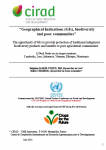A recent report, titled 'Geographical Indications, Biodiversity and Poor Communities,' explores how geographical indications (GIs) can support the conservation and sustainable use of traditional crop varieties through enhancing pro-poor value chains in developing countries.
 20 September 2014: A recent report, titled ‘Geographical Indications, Biodiversity and Poor Communities,’ explores how geographical indications (GIs) can support the conservation and sustainable use of traditional crop varieties through enhancing pro-poor value chains in developing countries.
20 September 2014: A recent report, titled ‘Geographical Indications, Biodiversity and Poor Communities,’ explores how geographical indications (GIs) can support the conservation and sustainable use of traditional crop varieties through enhancing pro-poor value chains in developing countries.
The report, published by Crops for the Future (CFF), Centre de Coopération Internationale en Recherche Agronomique pour le Développement (CIRAD), and the UN Conference on Trade and Development (UNCTAD), analyzes existing GI frameworks in Cambodia, Ethiopia, Indonesia, Laos PDR, Mauritania and Viet Nam, and develops recommendations for GIs to accommodate the needs of poor farmers and to conserve biodiversity.
GIs are used to identify goods of certain regions where quality, reputation or other characteristics are attributable to their geographical origin. The report suggests that GIs can help overcoming the limitations in developing markets for native products derived from traditional crop species and can help provide income to poor farmers and incentives for crop genetic resource conservation.
The report identifies weaknesses in existing GI systems and makes recommendations for strengthening their use as conservation tool, with regard to: supporting poor communities; maintaining biodiversity; providing efficient protection; and options to implement access and benefit-sharing mechanisms via a GI legal framework. [Publication: Geographical Indications, Biodiversity and Poor Communities: The opportunity for geographical indications to provide protection for traditional indigenous biodiversity products and benefits to poor agricultural communities][CFF News Release][Bioversity International News Release]